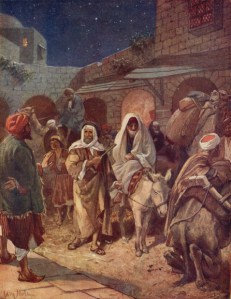Do youngsters still read The Adventures of Sherlock Holmes? I recall gobbling them up when I was a lad. There is one that I wish to call to your attention: It’s a story about a race horse called Silver Blaze. In the stories, Sherlock is always two steps ahead of the police, and so it is here. The Inspector asked Holmes:
“Is there any point to which you would wish to draw my attention?”
Holmes replied:
“To the curious incident of the dog in the night-time.”
“But,” the Inspector said “the dog did nothing in the night-time.”
“That was the curious incident,” remarked Sherlock Holmes.
The dog didn’t bark because it recognized the person who had entered the stable. It follows, therefore, that he must have been a member of the household, which was enough for Holmes to identify the culprit and so bring the case to a close. Today, I wish to speak, not about a dog that didn’t bark, but about parts of the Bible that aren’t read. For the fact is that here are many passages of Scripture that you never hear at Mass or read in your breviary. That, in itself, is not surprising. The Bible is a big book, and even with a three-year cycle, extensive as it is, we cannot expect to cover the entire Bible. What interests me, however, is the fact that there is a pattern to the omissions. In other words, certain aspects of Old-Testament thought were systematically eliminated by the liturgists who drew up the current lectionary we use at Mass. When I cite some of the expurgated passages, you will readily understand why they have been omitted. Let me start by quoting from Psalm 136/137. The final verses are brutal, all the more shocking given that the Psalm is otherwise one of the most beautiful and tender of all. It begins thus:
By the waters of Babylon,
there we sat and wept,
remembering Zion. . . .
If I forget you, O Jerusalem,
let my right hand wither! . . .
Then, at the end, like a blow to the face we have the lines:
O daughter of Babylon, you destroyer!
Blessed shall he be who takes your little ones
and dashes them against the rock!
I wonder what the congregation would think if they heard the choir singing these lines during Mass.
Such sentiments are by no means rare in the Old Testament. Psalm, 108/109, known as “the cursing Psalm,” is similarly strong stuff; you won’t find it in the lectionary or the office book. Back in the old days, when we took the Bible as it is, we recited all the Psalms in their entirety, including Psalm 108/109. I remember one of my classmates in the seminary, who would always skip that Psalm when it appeared in the divine office. And what did he find objectionable in it? A line or two from that Psalm will answer the question:
May his children be fatherless, and his wife a widow!
May his children wander about and beg; may they be driven out of the ruins they inhabit!
. . . .
Let there be none to extend kindness to him, nor any to pity his fatherless children!
And so on throughout. The Psalter, which has been called “a Christian hymnal,” is studded with similar passages, and I could spend all the space at my disposal in this brief essay reciting a selection of equally grizzly passages.
Nor is this attitude limited to the book of Psalms. Consider one of the most barbaric practices of ancient warfare, which was copied by Israel and is most difficult to reconcile with our conviction that God is loving, provident and merciful. I’m thinking about “the ban.” This was a command from God to destroy the enemy completely, to kill all the men, women and children, to raze the city to the ground and to destroy all the cattle and possessions of the conquered people. Joshua, the successor of Moses—whose name when translated into Greek is Jesus—fulfilled this command of the Lord when Jericho fell:
So the people shouted, and the trumpets were blown. As soon as the people heard the sound of the trumpet, the people raised a great shout, and the wall [of Jericho] fell down flat, so that the people went up into the city, every man straight before him, and they took the city. Then they utterly destroyed all in the city, both men and women, young and old, oxen, sheep, and asses, with the edge of the sword.
Joshua 6.20-21
The ban appears later in the history of Saul, the first king of Israel, who lost his kingship because he had not enforced the ban completely on the Amalekites as the Lord had commanded him to do:
Thus says the Lord of hosts, “Go and smite Amalek, and utterly destroy all that they have; . . . do not spare them, but kill both man and woman, infant and suckling, ox and sheep, camel and ass.”
1 Samuel 15.6
Saul’s fault in this event would not strike you as reprehensible. All he did was to let one man live—Agag, the king—and to put aside some of the cattle to be offered in sacrifice to the Lord. But this was reason enough for God to reject Saul as King: “I repent that I have made Saul king; for he has . . . not performed my commandments.” Then the Lord addressed Saul through the prophet Samuel: “Behold, to obey is better than sacrifice, and to hearken than the fat of rams.” It’s a noble sentiment, but for us it is tarnished by its context in the harsh practice of warfare in the ancient Near East.
I see I have raised questions that would require a book adequately to discuss. But let me point out a few aspects of these matters that will not only satisfy your intellectual puzzlement but also use these hard sayings to nurture your faith in the Lord, Jesus Christ.
I: Drama
The first approach to Old Testament violence is by way of drama. I mean by this remark to claim that the history of Israel can be compared a play, with a protagonist, namely the chosen people themselves. In a play or novel, or in a movie, the leading character is the focus of interest, and all the action is designed to show him off, whether we’re talking about James Bond or Hamlet. The minor characters have no other role than to provide opportunities for the hero to demonstrate his prowess. When James Bond, for instance, bumps off half-a-dozen thugs, almost in passing, we do not say to ourselves, “Their poor mothers!” That sort of character—nameless, anonymous, who really is a film “extra”—has no function in the drama at all except to illustrate some aspect of the hero. Similarly Shakespeare’s play is entitled Hamlet because Hamlet is the focus of our attention and the other characters in the play depend on him, like planets revolving around the sun. And so, when Hamlet in the graveyard picks up the skull of Yorick, who had been jester in the royal court, we are not meant to wonder much about “poor Yorick.” It’s Hamlet who concerns us. Well, that is how it is with the people of Israel in the Old Testament. Other nations—their rulers and their subjects—are introduced as nothing more than props to illustrate God’s providential care of his own favoured people. Thus, when Pharaoh’s army is drowned in the returning waters of the Red Sea, we are not called upon to mourn their deaths. On the contrary, they have no real existence as persons; they are not individuals. We are not to imagine an Egyptian wife or mother waiting in vain for the return of a husband or son. Rather, the Egyptian forces are introduced into the narrative to show God’s powerful intervention in favour of Israel. Listen to a line or two of the canticle of Miriam in Exodus 15: “I will sing to the Lord, for he has triumphed gloriously; the horse and his rider he has thrown into the sea. . . . they sank as lead in the mighty waters.” Even more obviously partisan is Psalm 135/136, which begins benignly enough: “O give thanks to the Lord, for he is good, for his steadfast love endures for ever.” But it then continues, “[The Lord] who smote the first-born of Egypt, for his steadfast love endures for ever,” and again, “[The Lord] who slew famous kings, for his steadfast love endures for ever.” This “steadfast love endures for Israel,” That’s the point. Their scattered and shattered foes have not more personal reality than the rock Moses struck in the desert to provide water for the people and their flocks. That’s my first observation.
II: Tribal
The second is another facet of this exclusive focus on the chosen people. We must remember that ancient Israel was a tribal society; in fact, another name for the nation is simply “The Twelve Tribes,” not altogether dissimilar in this regard from native Americans and Scottish highlanders in the past. The feature of such societies that concerns us here is their understanding of the profound sense of unity that downplays, to the vanishing point, the concept of the individual. “Who am I?” The answer would have been, “An Israelite.” That is my identity. Hence, what happens to one member affects every one, for good or for ill. In the book of Numbers, for example, the Lord God sent a plague upon all the Israelites because some of them had begun to worship false Gods. Twenty-four thousand are reported to have died until Phinehas the priest killed an Israelite man and his foreign wife by running them through with a spear.
And the Lord said to Moses, “Phinehas . . . has turned back my wrath from the people of Israel, in that he was jealous with my jealousy among them, so that I did not consume the people of Israel in my jealousy.”
Numbers 25.10-12
Something similar occurred when King David ordered a census to be taken of the people. This offended the Lord, presumably because it implied that David was relying more on the size of the nation than on the power of the Lord. Afterwards,
The word of the Lord came to the prophet Gad, saying, “Go and say to David, ‘Thus says the Lord, Three things I offer you. . . . Shall three years of famine come to your land? Or will you flee three months before your foes while they pursue you? Or shall there be three days’ pestilence?’” . . . Then David said to Gad, “I am in great distress; let us fall into the hand of the Lord, for his mercy is great.” So the Lord sent a pestilence upon Israel; and there died of the people from Dan to Beersheba seventy thousand men.
2 Samuel 24.11-14
It’s as if the entire tribe were only one person, without distinction of age, sex, or function. Thus, in tribal warfare, the enemy must be destroyed, for it is comprised of a single identity. Although this attitude is completely foreign to the rugged individualism of Americans, it shows itself whenever the spectre of racism appears. Ironically, today Jews themselves can be the butt of such prejudice, but sometimes so are Latinos, or blacks or Catholics—or, for that matter, even WASPS: White Anglo-Saxon Protestants, for you know, even minorities can be racist . It’s most pernicious form in the world today is found in the actions of Moslem terrorists. The members of ISIS, for instance, consider their tribe to be at war with ours, and the enemy is globally identified as “the West” or “America, the great Satan.” Hence they murder indiscriminately, for to be American, as we saw in New York on 9/11 is simply to be identified as ‘the enemy’, independently of one’s particular opinions or personal history. Hence, these Moslem fundamentalists make no distinction between the innocent and the guilty, children and adults, soldiers and civilians. We are all globally simply identified as “The Enemy,” all alike guilty and all targets for their violence.
III. GOD AS PROTAGONIST
A moment ago, I said that Israel was the protagonist, i.e., the leading character in the Old Testament. That statement has to be qualified, for really God himself is the protagonist. In ancient Judaism, God was seen as the immediate cause of every event. As believers, we know that God is in fact the ultimate cause of whatever happens, but we also admit a class of secondary causes. Let me illustrate what I mean. Suppose someone asked you why there are no trees in the desert. “That’s simple,” you would respond. “It doesn’t rain.” But an ancient Jew would have skipped the secondary and gone immediately to the primary cause, God. He would have answered, “There are no trees in the desert because God didn’t put any there. And it’s a good thing he didn’t, because, you know, they would have died.” Some of the resultant anthropomorphisms, by which God actions are described in human terms, can be almost charming and are certainly disarming. After the sin of Adam and Eve, when they had discovered that they were naked, it was “the Lord God [himself who] made for Adam and his wife garments of skins, and clothed them.” I like to think of God choosing the right animal skin and designing a wardrobe for the sinful couple. It certainly adds a humane touch to the event. It’s equally striking to learn that when Noah and his family were safely in the ark, God came down himself to shut the door from the outside. I wonder if it is going too far beyond the text to catch a hint here of the Incarnation, when God, in the person of Jesus, really did perform human actions.
More seriously, would be God’s direct action in delivering the Israelites from Egypt. Pharaoh refused to let the Jews leave, and his refusal is described as God’s doing. “God hardened Pharaoh’s heart,” we read in the book of Exodus. Noah’s flood is another instance of this emphasis on God as exclusive cause of everything that happens, good or bad, and it’s much more extensive than closing a porthole. Antiquarians inform us that flood stories were common in ancient Mesopotamia. There, unlike Egypt where the waters of the Nile were beneficent, the floods of the Tigris and the Euphrates periodically devastated whole regions, and it would have seemed that the entire world was under water. It’s important to note that the flood was accepted as factual; no one in the ancient Near East doubted that such a flood had actually taken place. They had seen it. It follows that the biblical authors had to incorporate into their religious worldview a universal flood just as philosophers today are required to take seriously the theories and findings of science. And so the Genesis narrative asks, and answers, the same sort of questions that, mutatis mutandis, people pose today: Why would God so act? How did animals and humans survive? How are human beings different as a result of the catastrophe? The biblical view, here as throughout, is rigorously moral: God rewards virtue and punishes vice. Hence, a severe punishment—the flood—was occasioned by a great evil, and human history details that evil, in that the brutal murder of Cain began a chain of violence that spread wider and wider in society until only one just man was left: Noah, whose father was Lamech, the son of Methuselah, of the line of Seth, who was the son given to Adam and Eve as a quasi-replacement for the murdered Abel—a truly noble lineage. The purpose of the story is, therefore, to discern how God’s providence and justice are found to be at work in the great flood, by which he delivered the just and punished the unjust. To begin with, Noah, as God’s agent, was from the start as faultlessly virtuous as Abraham or Job. If he had not been so, there would have been no one to justify God’s beneficent interest mankind. Furthermore, in the Old Testament where God is the principal actor, there is a reassuring inevitability about the course of events. Interest in the account of Noah’s flood is therefore more on the means God takes to overcome man’s sin than on the sinfulness itself. In other words, the Bible’s focus is primarily theological while the modern readers will tend to make it psychological, sociological or simply dramatic as in the film Noah from a couple of years ago. And again, the victims of the flood have no identity; their dire fate to God’s justice to sinners as the deliverance of Noah and his family show his providential care of his holy ones.
IV: Development
I have attempted to penetrate below the surface of the violence of the Old Testament by noting the exclusive attention to the fortunes of the Jews in the history of the chosen people.
Personal
More important than this, especially for us as Christians, is the fact that there was a development in Israel that emphasized individual responsibility and what we would call a social conscience. The great prophets are eloquent in defending the poor and the outcasts of society.
Wash yourselves; make yourselves clean; remove the evil of your doings from before my eyes; cease to do evil, learn to do good; seek justice, correct oppression; defend the fatherless, plead for the widow.
Isaiah 1.16-17
The Psalms, too, emphasize personal responsibility and concern for others. Psalm 14/15 is one such, and it has many parallels in the prophetical books:
O Lord, who shall sojourn in thy tent? Who shall dwell on thy holy hill? He who walks blamelessly, and does what is right, and speaks truth from his heart; who does not slander with his tongue, and does no evil to his friend, nor takes up a reproach against his neighbour.
We find that the prophets Jeremiah and Ezekiel both emphasize the change from collective to personal responsibility, using and then reversing a proverbial saying: “In those days they shall no longer say: `The fathers have eaten sour grapes, and the children’s teeth are set on edge. But every one shall die for his own sin; each man who eats sour grapes, his teeth shall be set on edge.” (Jer. 31.29-30)
Historical (= the nations)
Another development occurred that considerably broadened Israel’s attitude towards the pagan nations. History was the agent of the change. In 587 B.C. Jerusalem fell to Nebuchadnezzar, and the people were exiled to Babylon. A crucial decision was thereby forced upon the nation. According to the common mythology of the ancient Near East, when a country was defeated and dispersed, its gods were also destroyed or made subservient to the gods of the conquerors. Two options were therefore available to the Jews. They could abandon the Lord God or they could recognize his hand at work in the actions of the King of Babylon. Their faith in God was so strong that they could not but choose the latter: Nebuchadnezzar was nothing more than an instrument in the hands of God who had employed by him to punish the sins of his people. (As always, they interpret natural or political calamities in moral terms.) But then they came to the realization of a further implication of their belief in one and only one God. If the fate of Israel was in his hands, then so must the destiny of all the nations of the world be equally under his control . . . and under his care. The prophets—Isaiah, Jeremiah, et al.—were inspired by the Holy Spirit to proclaim this novel insight into the meaning of divine providence, but without, of course, surrendering the unique status of Israel in God’s plan. They came to view the chosen people as the entry point of God into human history, but with an ever-increasing awareness that one day the privileges of Israel would be made available to all the nations of the world. Many passages of the prophetical books witness to this conviction, as in the second chapter of Isaiah:
It shall come to pass in the later days, that the mountain of the house of the Lord shall be established as the highest of the mountains, . . . and all the nations shall flow to it and many peoples shall come and say: Come, . . . that he may teach us his ways and the we may walk in his paths.
Or consider the exhortation of Psalm 116/117: “Praise the Lord, all nations! Extol him all peoples! . . .”
V: The Messiah
But how would this marvel be accomplished? For the prophets it was to be God’s doing. One day he would send a Messiah who would re-establish the Kingdom of David and Solomon to its full grandeur, with all the nations of the world participating in its glorious restitution. Thus we find in Ezekiel (ch. 34):
And I will set up over them one shepherd, my servant David, and he shall feed them and be their shepherd. And I, the Lord, will be their God, and my servant David shall be prince among them.
A similar prophecy is found in the book of Micah (5.2), and is quoted by Matthew in his account of the interview between the magi and King Herod: “But you, O Bethlehem, who are little to be among the clans of Judah, from you shall come forth for me one who is to be ruler in Israel, whose origin is from of old, from ancient days.” Given that David came from Bethlehem, the new David, the Messiah, with also be from Bethlehem.
Well, the Messiah has come and his name is Jesus Christ. I have described the Old Testament as an ongoing, developing revelation of God to his people. This implies a directed movement, a goal for sacred history; it was not a haphazard chain of historical events. The climax could hardly have been predicted, but once known it is surpassingly right: God completed the gradual unveiling of his person to mankind by sending his own Son into the world to accomplish once and for all, definitively, what the patriarchs, kings and prophets of Israel had so long desired: “When the time had fully come, God sent forth his Son, born of woman, . . . so that we might receive adoption as sons. And because you are sons, God has sent the Spirit of his Son into our hearts, crying ‘Abba, Father!’” (Gal 4.4-6). It follows that in encountering Jesus we have direct contact with God himself, and the more profound is our appreciation of this fact the more enlightened we shall be about God’s interventions as recorded in the history of the chosen people. A good way to describe our attitude to the Old Testament is that, as Christians, we read the Bible backwards. By that I mean that we start with the figure of Jesus Christ and use him to understand what preceded him. Saint Paul is our best guide here: the people and the events of the Old Testament, he said, are for our instruction (cf. 2 Cor 10.6). If there was an original Adam who was the progenitor of the human race, there will be another Adam who will give a new start to all mankind. Was there a Moses who gave the Hebrews a code of law that defined their national identity as God’s special people? There will be another Moses who will deliver his law, not from Mount Sinai, but from the Mount of the Beatitudes to establish a new chosen people, what Saint Paul called “the Israel of God” (Gal 6.16). Was there a David who was like a shepherd to his people? There will be another shepherd—“I am the good shepherd, and I know my own and my own know me” (Jn 10.14). We are the sheep of his flock and we follow him because we hear and recognize his voice.
Conclusion
We can further establish principle of biblical interpretation by applying it to the characteristics that I identified in the Old Testament. There were four of them: the idea of a drama with the people as the leading actor; the idea of a tribal identity so strong that it eliminated almost entirely individual identity; the recognition that the protagonist is better described as God himself rather than the Hebrew nation; and finally, the development propounded by the prophets of personal responsibility. What are their counterparts in the New Testament?
In the first, the idea of a drama, secondary characters exist only to illustrate the actions and motives of the leading actor. I noted that the protagonist in the Old Testament is the entire nation. What do we find in the New Testament? It is this: the original people of Israel has been replaced by the Church. She is now the leading actor in the drama of salvation that is played out across human history.
The second characteristic of Old Testament times was a tribal feeling that could ignore the identity and destiny the particular person in the tribe, especially of the enemy tribe. This too has its benign counterpart in the Church seen as the body of Christ. The union among Christians is much more profound than mere biological identity, than mere physical descent that guaranteed membership in the chosen people. We are like branches on the vine that is Christ; we are members of the mystical body of Christ; we are living stones built into a temple where God himself dwells. And what is good in one member redounds to the benefit of all: “If one member suffers, all suffer together; if one member is honored, all rejoice together” (1 Cor 12.26). Furthermore, this new “tribe,” which has been established by our having been baptized into Christ, is not engaged in physical warfare, for Christ said, “My kingdom is not of this world.” There is no enemy to be annihilated because all the nations of the world have been called to a unity of love and service in Jesus. Even the violence of the Old Testament—those curses that are so unsettling—is susceptible to Christian cleansing. Saint Augustine interpreted that shocking bit about bashing babies against a rock at the end of Psalm 136/137 in terms of the spiritual life. The infant children of the enemy, of “Babylon,” he said, represent the first, tiny beginnings of evil desires, the earliest and weakest inclinations we find within ourselves to sin. They are to be destroyed completely, lest by growing in our hearts these vile thoughts should exhibit their full development in a hardened and corrupt way of life.
Similarly, [number three] the point I made about changing the protagonist from the people to God himself, is the basis of the entire Christian religion. God is indeed at work among the people in the person of Jesus. How surpassingly wonderful this truth is! The creed expresses it best: “Jesus Christ, . . . God from God, light from light, true God from true God, begotten not made, consubstantial with the Father, “who for us men and for our salvation died and rose again. God is present and active among us.
Finally, [number four] I mentioned the development that took place in ancient Israel, when the prophets moved from a focus on the tribe to individual responsibility. This moral demand has its counterpart in the spiritual perfection that we find in the saints and, surpassingly, in Our Lady. It’s an idea for each of us, as we recite every time we say Mass. I’m thinking of the prayer the priest says after the recitation of the Our Father: “Deliver us Lord, we pray, from every evil . . . that we may be free from sin and safe from all distress.” This moral insight was achieved without compromising the conviction that Israel was the chosen people, a conviction that we can now recognize as a prophecy of the Church as the “new Israel,”[1] the new people of God.
We have a noble calling. Christ has conquered sin and death, and we have died and risen again with him in the waters of baptism. The Christian life may seem demanding, but we are made for heroism and, to quote Psalm 18, we are powerful for good, “like a strong man, running his course with joy.”
[1] This title is first encountered in the writings of Justin Martyr.












